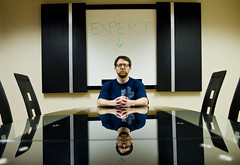| EXPERT, but is he YOUR expert? And how do you know he didn't give bad advice? (Photo credit: Pete Prodoehl) |
Well... Maybe, but only if it's actually GOOD advice, something you are NOT equipped to determine, as that's why you're seeking the advice in the first place!
Ah, but you say, I'll just ask an expert!
So what constitutes an expert?
Uh... credentials?
Sorry, credentials do NOT prove their expertise. Not only can credentials be faked (just the other day Yahoo's CEO was forced to resign over a flap over his non-existent computer science degree), you can enroll in fake universities who will give you fake degrees and diplomas for $$$$. Credentials must be verified and confirmed.
How about reputation?
Reputation helps, but there is always a chance of slip-up. Associated Press and other famous newspapers have been taken by hoaxes before. Remember the infamous "Internet Explorer users have lower IQ" hoax? It was carried by all the newspapers and media outlets. You cannot just use the source to prove the premise's worth.
How about experience?
Nope. Just because one has experience the "problem" or "situation" does not make one an expert. I had caught and survive many 'colds'. Does that make me a 'cold expert'? No! It's anecdotal fallacy if you don't verify the info.
Okay, what constitutes an expert?
Honestly? I don't know. Reputation is important, and credentials are important, AND experience certainly helps, but one must always be somewhat skeptical of all claims. I can tell you that there are FOUR WAYS an expert can fail:
- Failure by omission
- Failure by slacking
- Failure by out-of-field
- Failure by appearance
And we are talking about genuine experts here, with proper reputation and credentials. They can STILL offer you bad advice.
The fake experts deserve a blog post all on their own, but usually all you need to pierce their disguise is a bit of skepticism.
So when some expert offers you advice, like "What MLM to join" or "Join this one, it's the best one around", you MAY want to be a little skeptical. Make sure he really is an expert, and he didn't commit one of the four failures. Otherwise, his advice may be bogus, and hurts you in various ways.
[ Find out more about the four ways experts fail ]







I like your posts. Logic and fallacies. These fallacies are so common it's ridiculous. Would like to read more on the 4 failures.
ReplyDelete